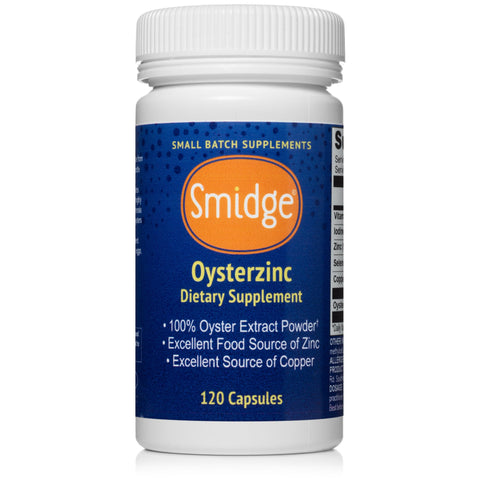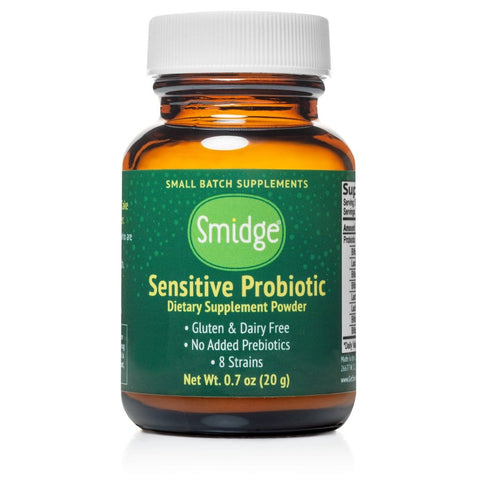What strains and ingredients did you leave out of the formula for people with sensitivities?
We've had customers who've tried a dozen – sometimes as many as 20 – different probiotic formulas. And after years of frustration and despair, they've told us that this formula is the one that finally worked for them. Here's why:
-
No histamine-producing strains (Our Sensitive Probiotic contains only histamine-neutral or histamine-degrading strains of probiotic bacteria)
-
No strains known to contribute to D-lactate acidosis
-
No streptococcus thermophilus or other strains linked to adverse reactions
-
No spore-forming strains of probiotics (e.g. soil bacteria)
-
No inulin, maltodextrin or other prebiotics that can feed pathogens
-
No excipients and other added ingredients, i.e., magnesium stearate, silica, titanium dioxide
-
No common allergens: All strains are grown on a dairy-free, soy-free, vegetarian, non-GMO culture. Does not contain milk/casein, eggs, fish, shellfish, wheat/gluten, peanuts, tree nuts, yeast, corn or soy
What is the difference between your Sensitive Probiotic capsules and the powdered version?
Both Smidge® Sensitive Probiotic capsules and Sensitive Probiotic powder contain the same formula: the same strains in the same ratios.
The capsules contain cellulose, which is required to keep the powder in capsule form. The capsules have 5 billion CFUs per capsule, allowing for easy titration of doses.
The powder does not contain any additional ingredients at all.
The powder contains 6 trillion CFUs per bottle; the capsules contain 600 billion CFUs per bottle. In other words, one bottle of Smidge® Sensitive Probiotic Powder is the equivalent to 10 bottles of the capsules. Although the powder costs more upfront, it's more economical in the long run.
Our customers choose the capsules for convenience, whether they have a student in college, are traveling or just want to pop a little pill and run out the door.
For families all using the same probiotic, we recommend Smidge® Sensitive Probiotic Powder, as you can easily individualize the doses with the cute mini measuring spoon, and because there are more doses of the pure powder.
Can you ship Smidge® Sensitive Probiotic capsules in hot temperatures?
Yes! Smidge® Sensitive Probiotic capsules (and all of our probiotics!) can be shipped when it's hot outside. Because it requires refrigeration, we only ship orders Monday through Wednesday using two-day premium shipping services that include tracking. We also have an overnight shipping option.
Smidge® probiotics are freeze-dried, so they hold up well to warm temperatures.
What is the best time and way to take my Sensitive Probiotic capsules?
Here's the fun part. We recommend taking your probiotic with a meal (around the same time daily). It's beneficial if the meal also contains some natural, organic fat or oil.
Taking your probiotic with real food provides a buffering system for the supplement and ensures its safe passage through the digestive tract. Food also provides the friendly bacteria in your probiotic the proper nourishment to ensure its survival in your gut.
Our probiotics work best with an ancestral diet: unprocessed foods (meat, vegetables, fruits), healthy fats (olive oil, butter, lard, coconut oil, etc.) and no grains (i.e., no wheat, corn, rice, soy, etc.).
Please avoid taking probiotics with certain foods that may diminish the potency:
-
Avoid chlorinated water.
-
Avoid hot soup and hot beverages (coffee, tea, etc.).
-
Avoid highly processed foods (store-bought juice, sugar, wheat and soy products).
What kind of diet should I eat while on Smidge® Sensitive Probiotic capsules?
Our probiotics and supplements work best in conjunction with a wholesome, real food diet. Think healthy fats, wild-caught fish, grass-fed meat, organic fruits and vegetables, and the elimination of pesticides, GMOs, additives, preservatives, chemicals and processed sugar/flour. So eat clean and eat up!
How long does one bottle of Smidge® Sensitive Probiotic capsules last?
At the average adult dose of 2 capsules per day, one bottle will last 30 days.
Is this Sensitive Probiotic free of common allergens?
We wouldn't have it any other way :) Our Sensitive Probiotic capsules are free of common allergens. All strains are grown on a dairy-free, soy-free, vegetarian, non-GMO culture. It does not contain milk/casein, eggs, fish, shellfish, wheat/gluten, peanuts, tree nuts, yeast, corn or soy.
Is it freeze-dried or live?
Smidge® Probiotics are comprised of freeze-dried bacteria. Old school probiotics contained live cultures that died in transit due to warm temperatures. Freeze-dried bacteria are able to withstand warmer temperatures during transit.
Where are the ingredients in Smidge® Sensitive Probiotic sourced and where is the supplement made?
The strains in our Sensitive Probiotic capsules are sourced and produced in the U.S. :)
How many strains does this formula have?
Smidge® Sensitive Probiotic capsules have eight clinically-proven strains of probiotics for gut health (seven human strains: L. gasseri, L. salivarius, B. bifidum, B. breve, B. infantis, B. longum, B. lactis; and L. plantarum, a plant-based strain).*
I have histamine intolerance and/or sensitivity to D-lactate. How will this product affect me?
Before starting any new supplement, it’s best to first run it by your doctor. But, each of the eight strains in our Sensitive Probiotic powder has extensive research supporting their safety and efficacy in helping to revitalize the body.* We also considered the growth rate of these strains, so they would help maintain the balance in your gut.* For instance, its histamine-degrading strains balance the histamine-forming strains in the proper ratio.* This way, you can maximize your probiotic benefits while still minimizing your exposure to D-lactate and histamine.
How are the strains in Sensitive Probiotic beneficial for D-lactic acidosis?
D-lactic acidosis occurs when the body produces an excess of a poorly-metabolized form of lactic acid (as compared to the more common and more readily metabolized L-lactic acid). Folks often experience brain fog— cloudy thinking, difficulty concentrating, fatigue and forgetfulness. These mental symptoms can be accompanied by digestive issues such as bloating, abdominal discomfort and distension, and gas after meals.*
Here is the Smidge® philosophy in relation to avoiding side effects from D-lactic acidosis. Eating processed foods and sugar can contribute to gut dysbiosis, both of which are contributing factors to D-lactic acidosis. Taking a probiotic that contains acidophilus as its primary strain, which generates D-lactic acid, can worsen things.
Many eventually realize this and take a probiotic that avoids D-lactate strains — a great first step! But to really tackle the issue of D-lactic acidosis, many have found relief from eating a diet full of fresh, real, unprocessed foods, and taking a probiotic containing plantarum. Studies show that despite containing D-lactic acid and L-lactic acid, plantarum can reduce lactic acid and may even reduce lactic acidosis.*
Here’s how: L. plantarum initially produces L(+)-lactate, and then switches to making D(-)-lactate, allowing for equilibrium. The production of D(-)-lactate in L. plantarum is linked to the cell wall's biosynthesis.
So, Smidge® Sensitive Probiotic contains seven strains that only produce L-lactic acid — and L-plantarum has been shown to reduce D-lactic acidosis.* In all, plantarum is a powerful probiotic strain that, when combined with a healthy diet, can restore or address gut dysbiosis.*
Does this probiotic contain prebiotics?
No. Most commercial probiotics are up to 80% prebiotics. This is notable because adding prebiotics reduces the potency of a probiotic supplement and therefore, reduces the cost per bottle. More importantly, we intentionally keep prebiotics separate from our probiotic formulas. We do not (add any additional ingredients), as many of our customers have very sensitive digestive systems or are biohackers who only want purity.
A probiotic can work alone and does not require a prebiotic. Our pure probiotics can colonize without a prebiotic. Additionally, not all people taking a probiotic need a prebiotic. We recommend starting our probiotics without a prebiotic, before determining whether or not to add it to your protocol. We believe it's essential to focus on diet and real food to support the colonization of good gut bacteria.
Here's some additional background regarding our philosophy on prebiotics:
Most commercially available prebiotics are made from FOS/inulin. This starchy, sugary substance is counterproductive to gut health and overall health. There's also a concern that some kinds of yeast can use inulin/FOS for fuel, thereby leading to overactive yeast production in the body.
How can a quality probiotic help avoid diarrhea and constipation?
Probiotic bacteria have the intelligence to aid with diarrhea and constipation, by modulating and regulating water in the colon to provide regularity.* So when you take quality probiotics regularly in combination with a whole food diet, your digestion and regularity are well, regular!*
What is oxalate sensitivity and how does Sensitive Probiotic help?
Oxalate sensitivity is triggered by certain greens, veggies and fruits that people with sensitive digestive systems cannot handle, and it’s similar a histamine reaction. The L. plantarum in Sensitive Probiotic works to remove oxalates that can build up in the system and cause inflammation or dysbiosis.





Comments (0)
There are no comments for this article. Be the first one to leave a message!